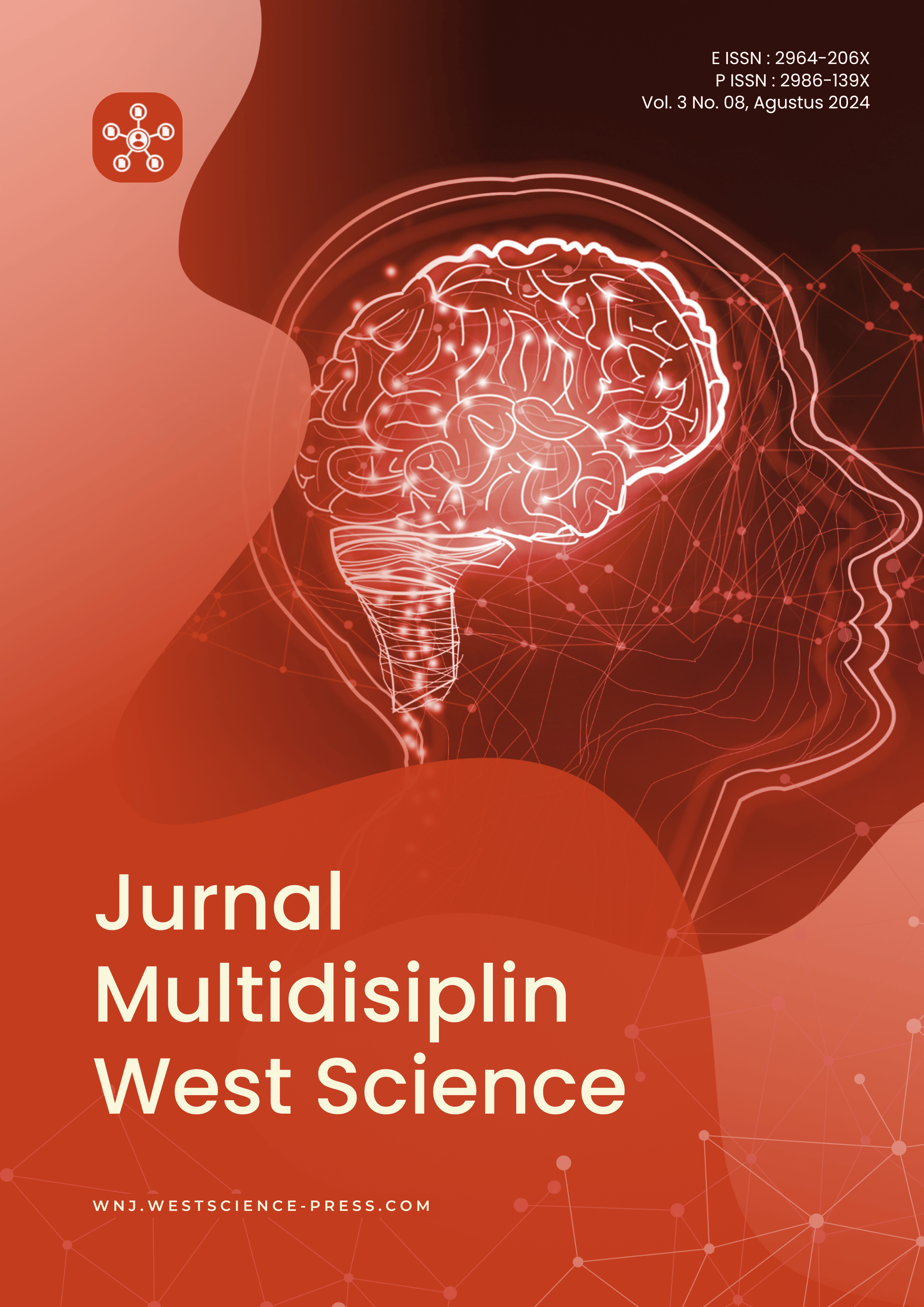Strategi Pemanfaatan Media Sosial Dalam Meningkatkan Kesetiaan Pelanggan Restoran
DOI:
https://doi.org/10.58812/jmws.v3i08.1577Kata Kunci:
Nilai Persepsian, Media Sosial, Kepuasan, Kesetiaan, RestoranAbstrak
Penelitian ini bertujuan untuk menguji bagaimana media sosial mempengaruhi hubungan antara nilai persepsian, kepuasan pelanggan, dan kesetiaan pelanggan. Data dikumpulkan melalui kuisioner secara daring yang disebar melalui beberapa platform seperti WhatsApp, Instagram, Facebook, dan Telegram, dengan sampel sebanyak 200 responden yang dipilih menggunakan teknik purposive sampling. Analisis regresi logistik digunakan untuk menguji hipotesis-hipotesis dalam penelitian ini. Hasil penelitian menunjukkan bahwa dari empat hipotesis yang diuji, tiga hipotesis terbukti signifikan, sedangkan satu hipotesis tidak mendapatkan dukungan. Spesifiknya, kepuasan pelanggan secara positif mempengaruhi kesetiaan pelanggan, nilai persepsi memiliki pengaruh positif terhadap kepuasan pelanggan, dan media sosial memoderasi hubungan antara kepuasan pelanggan dan kesetiaan pelanggan. Namun, tidak ada bukti bahwa media sosial memoderasi hubungan antara nilai persepsian dan kepuasan pelanggan.
Referensi
Agustina, F. I. (2020). Pengaruh Persepsi Nilai dan Kepuasan Konsumen terhadap Loyalitas Konsumen Alfamart di Kota Mataram. Media Bina Ilmiah, 14(9), 3151-3160. http://ejurnal.binawakya.or.id/index.php/MBI
Bigne, E., Andreu, L., Perez, C., & Ruiz, C. (2020). Brand love is all around: loyalty behaviour, active and passive social media users. Current Issues in Tourism, 23(13), 1613-1630. https://doi.org/10.1080/13683500.2019.1631760
Cao, D., Meadows, M., Wong, D., & Xia, S. (2021). Understanding consumers’ social media engagement behaviour: An examination of the moderation effect of social media context. Journal of Business Research, 122, 835-846. https://doi.org/10.1016/j.jbusres.2020.06.025
Dagger, T. S., & O'Brien, T. K. (2010). Does experience matter? Differences in relationship benefits, satisfaction, trust, commitment and loyalty for novice and experienced service users. European Journal of Marketing, 44(9/10), 1528-1552.
Gultom, M., & Ngatno, N. (2020). Pengaruh Kualitas Produk Dan Harga Terhadap Loyalitas Pelanggan Melalui Kepuasan Konsumen Smartphone Samsung Di Semarang. Jurnal Ilmu Administrasi Bisnis, 9(1), 169-178. https://doi.org/10.14710/jiab.2020.26235
Hapsari, R., Clemes, M. D., & Dean, D. (2017). The impact of service quality, customer engagement and selected marketing constructs on airline passenger loyalty. International Journal of Quality and Service Sciences, 9(1), 21-40. https://doi.org/10.1108/IJQSS-07-2016-0048
Ibrahim, B., Aljarah, A., & Ababneh, B. (2020). Do social media marketing activities enhance consumer perception of brands? A meta-analytic examination. Journal of Promotion Management, 26(4), 544-568. https://doi.org/10.1080/10496491.2020.1719956
Jenneboer, L., Herrando, C., & Constantinides, E. (2022). The impact of chatbots on customer loyalty: A systematic literature review. Journal of theoretical and applied electronic commerce research, 17(1), 212-229. https://doi.org/10.3390/jtaer17010011
Kotler, Philip., & Kevin Lane Keller. (2016). Marketing Manajemen. England : Pearson.
Kulikovskaja, V., Hubert, M., Grunert, K. G., & Zhao, H. (2023). Driving marketing outcomes through social media-based customer engagement. Journal of Retailing and Consumer Services, 74, 103445. https://doi.org/10.1016/j.jretconser.2023.103445
Lai, C. C., & Chen, Y. C. (2011). A user-oriented image retrieval system based on interactive genetic algorithm. IEEE transactions on instrumentation and measurement, 60(10), 3318-3325. DOI:10.1109/TIM.2011.2135010
Lina, R. (2022). Improving Product Quality and Satisfaction as Fundamental Strategies in Strengthening Customer Loyalty. AKADEMIK: Jurnal Mahasiswa Ekonomi & Bisnis, 2(1), 19-26. https://doi.org/10.37481/jmeb.v2i1.245
Oliver, Richard L. (1997). Whence Consumer Loyalty?.Journal of Marketing, 63, 33-44.
Pang, H. (2021). Identifying associations between mobile social media users’ perceived values, attitude, satisfaction, and eWOM engagement: The moderating role of affective factors. Telematics and Informatics, 59, 101561. https://doi.org/10.1016/j.tele.2020.101561
Putro, S. W. (2014). Pengaruh kualitas layanan dan kualitas produk terhadap kepuasan pelanggan dan loyalitas konsumen Restoran Happy Garden. Jurnal Strategi Pemasaran, 2(1), 1-9. https://publication.petra.ac.id/index.php/manajemen-pemasaran/article/view/1404/0
Rasheed, F. A., & Abadi, M. F. (2014). Impact of service quality, trust and perceived value on customer loyalty in Malaysia services industries. Procedia-Social and Behavioral Sciences, 164, 298-304. DOI:10.1016/j.sbspro.2014.11.080
Rust, R. T., & Oliver, R. W. (1994). The death of advertising. Journal of advertising, 71-77. https://doi.org/10.1080/00913367.1943.10673460
Slack, N., Singh, G., & Sharma, S. (2020). Impact of perceived value on the satisfaction of supermarket customers: developing country perspective. International Journal of Retail & Distribution Management, 48(11), 1235-1254. DOI:10.1108/IJRDM-03-2019-0099
Srivastava, M., & Rai, A. K. (2018). Mechanics of engendering customer loyalty:A conceptual framework. IIMB management review, 30(3), 207-218. DOI: 10.1016/j.iimb.2018.05.002
Tam, J. L. (2004). Customer satisfaction, service quality and perceived value: an integrative model. Journal of marketing management, 20(7-8), 897-917. https://doi.org/10.1362/0267257041838719
Veloutsou, C. (2015). Brand evaluation, satisfaction and trust as predictors of brand loyalty: the mediator-moderator effect of brand relationships. Journal of Consumer Marketing, 32(6), 405-421. https://doi.org/10.1108/JCM-02-2014-0878
Yarış, A., & Aykol, Ş. (2022). The impact of social media use on restaurant choice. Anatolia, 33(3), 310-322. DOI:10.1080/13032917.2021.1931379
Zibarzani, M., Abumalloh, R. A., Nilashi, M., Samad, S., Alghamdi, O. A., Nayer, F. K., ... & Akib, N. A. M. (2022). Customer satisfaction with Restaurants Service Quality during COVID-19 outbreak: A two-stage methodology. Technology in Society, 70, 101977. DOI:10.46222/ajhtl.19770720.349
Unduhan
Diterbitkan
Cara Mengutip
Terbitan
Bagian
Lisensi
Hak Cipta (c) 2024 Jeremy Cristyano Santoso, Waluyo Budi Atmoko, Ariefah Yulandari

Artikel ini berlisensiCreative Commons Attribution-ShareAlike 4.0 International License.



















 Instagram
Instagram 